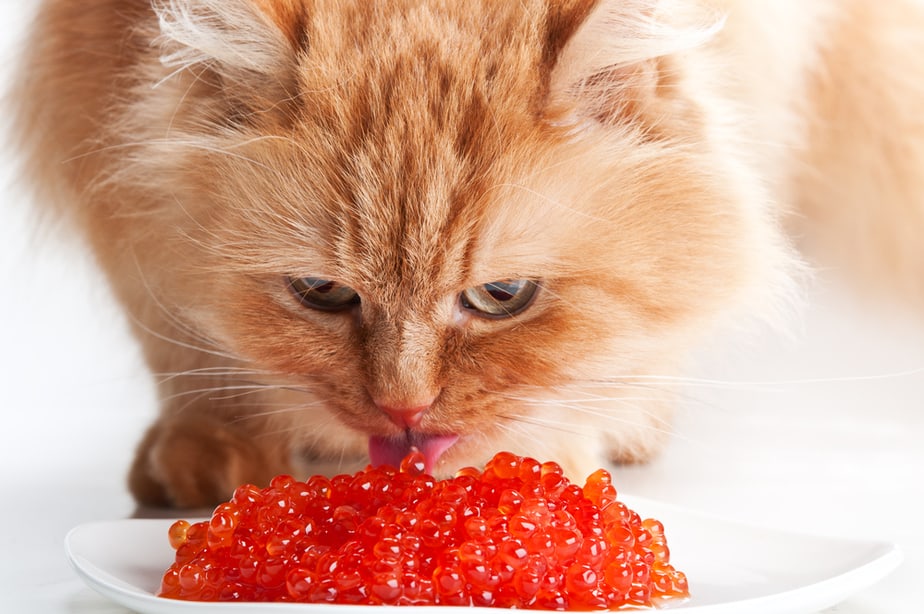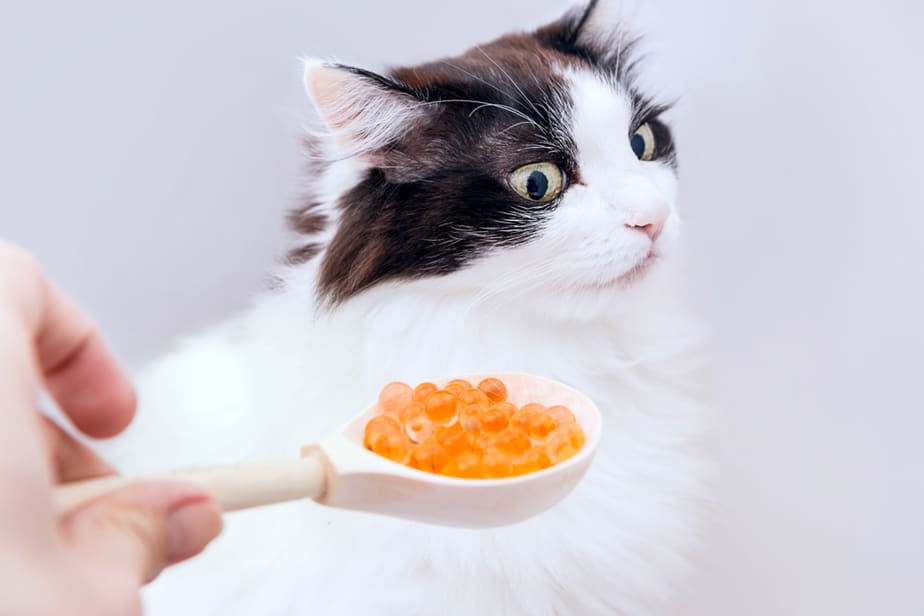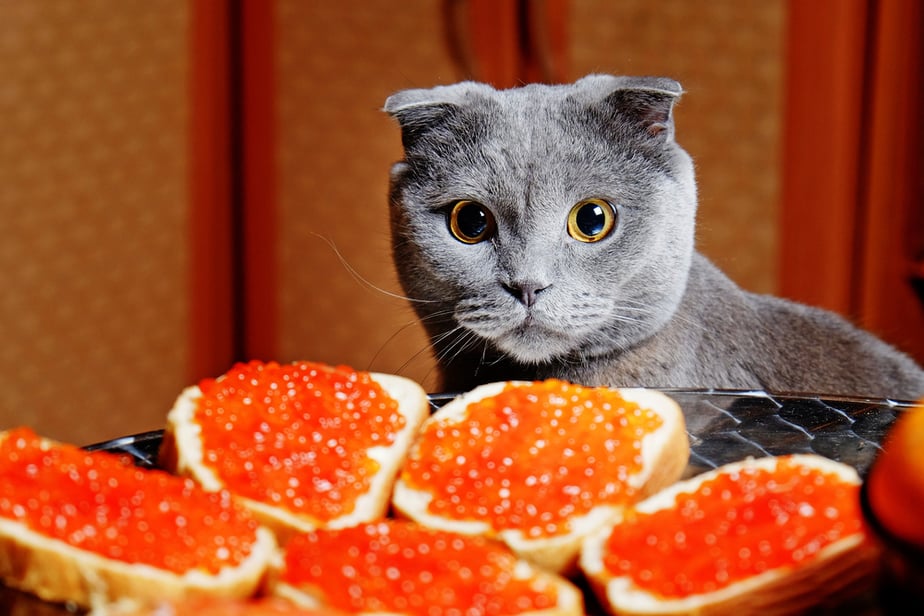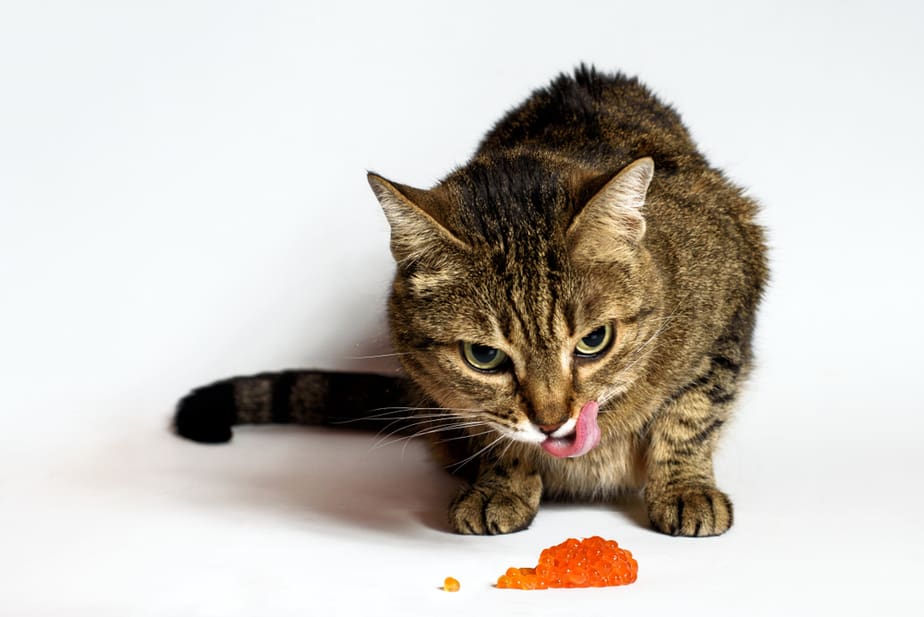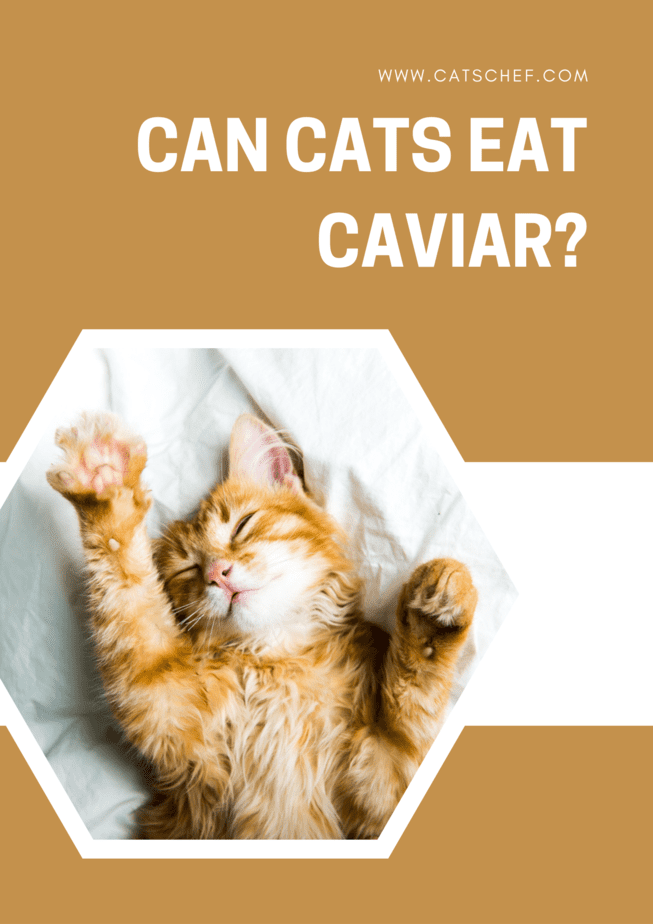📖 Table of Content:
Caviar is an expensive food famous all across the human world, but how does it fit into the cat world? Can cats eat caviar safely and enjoy its delicious taste?
We know how curious our little creatures get, but they are cautious as well. They’ll want to sniff at new things but they will also keep count of their nine lives.
Felines usually know when it’s okay to eat something and when it’s best to let it slip. They have strong instincts and a superior sense of smell that help them detect whether some food is the right or wrong choice for them.
However, can cats eat caviar, and what exactly is this seafood considered a delicacy?
Why is caviar so famous?
Caviar is a salt-cured roe of the fish belonging to the sturgeon family. They’re old, rare creatures which means that their caviar is also expensive, so the idea of your pet eating all of it isn’t so appealing.
It’s also unlikely that your feline will come across caviar at any point in her life. Usually, caviar is exclusive to upscale restaurants due to its high price.
Unless you decide to take her out on a fancy date, you shouldn’t worry about your cat making a big, caviar-shaped dent in your wallet. Still, you’re skeptical about this food because you’re not sure if cats can safely eat caviar.
Can cats eat caviar?
This fine food can be eaten as a garnish or a spread, making it a perfect decoration for your dish. It can also be consumed raw or salt-cured, pasteurized, or non-pasteurized.
While this may sound appealing, it’s natural to have doubts about this food. Can cats eat caviar and is it safe for them? Let’s reveal the mystery behind this exotic dish!
Generally speaking, caviar is fine for feline consumption as long as you provide it as an occasional treat, and not as a substitute for your cat’s regular meal. You’ve never seen a cat diving for some caviar, right?
As we previously stated, felines are led by their strong instincts. This stops them from searching for food in the water because guess what – cats don’t really like swimming.
Although they’re a fan of fish, we’re not so sure if caviar will be enough to attract your fussy eater. Your furry friend goes for foods that can provide them with plenty of nutrients.
However, caviar is scarce and that’s why there’s a variety of it known as artificial or imitation caviar. Let’s see what’s the difference and if cats can eat either type of caviar.
Is raw caviar safe for cats?
Fresh, raw caviar is a traditional type of this dish with no additions to it. It’s the most expensive variety of this food and can only be found in very distinguished places. Even though it’s a pricey delicacy, it doesn’t mean it’s something cats should indulge in.
Fresh caviar is not cooked or processed in any way. Although this helps preserve the flavor and often makes it richer, it’s not an ideal way to serve it to your pet. Unfortunately, raw seafood like sardines contains multiple health hazards to felines.
These raw products can potentially carry diseases such as Salmonella and E.coli, as well as other bacteria and parasites. Cooking the food is the safest way to ensure bacteria and parasite elimination, so cats can only eat minute amounts of raw caviar.
In severe cases, uncooked foods can cause poisoning in cats, and they can experience a variety of symptoms. These include vomiting, diarrhea, as well as dizziness, and drooling.
Therefore, if you’re still wondering can cats eat caviar? you might want to weigh out the pros and cons first. We’ve seen the disadvantages, but are there any health benefits for your furry friend?
When speaking of caviar, we’re aware of the fact that it comes from fish. As a responsible cat parent, you know that your four-legged friend is an obligate carnivore.
It means they need protein to survive, which is found in animal-derived foods. Therefore, the conclusion is that cats can benefit from eating caviar, but this shouldn’t be the reason to feed her this dish often.
Despite the small amount of protein found in it, you should remember all the possible dangers this food holds. For that reason, perhaps the cons are going to outweigh the pros after all.
Is salt poisoning a potential risk?
Raw caviar isn’t cooked, but it’s salt-cured; meaning it goes through a process that helps preserve its freshness and taste.
However, this process requires large amounts of salt that can be found in any salt-cured products, such as turkey bacon and beef jerky.
This protects the food against discoloration and rotting. However, it’s a major health hazard for felines if they end up eating too much of it. Excessive salt intake leads to sodium toxicity in cats, and they can suffer a range of symptoms. Some of these include vomiting, diarrhea, as well as dehydration, and excessive thirst.
Therefore, try to keep your silly pet away from food items that are filled with lots of salt and artificial preservatives.
Can cats eat imitation caviar?
Imitation caviar production uses lumpfish roe and some other ingredients. This substitution for real caviar is way more affordable and more widely available.
And we all know that low price means low quality as well. So, can cats eat imitation caviar and why is it so different from the traditional one?
Artificial caviar contains salt, sugar, thickening agents, as well as coloring. It goes without saying that sugar is harmful to felines as much as salt is, but what about the other ingredients?
Thickening agents are used in many foods to bind the components together, and therefore, thicken the product. However, these are mostly artificial preservatives that are harmful to cats in the long run.
The coloring used in artificial caviar might surprise you. Providing both the distinct color and taste – it’s the squid ink. The color can range from black to red as it’s not processed much before being added to the caviar.
However, certain additives can be included in the squid ink to help enhance the flavor. Again, this isn’t something that will benefit your cat.
To wrap it up
If you ever wondered can cats eat caviar, we hope that we’ve cleared it up for you. Small portions shouldn’t be troublesome, but keep in mind that there are plenty of high-quality cat foods that don’t need replacement.
Real caviar is expensive but has animal protein that attracts felines. Despite this healthy nutrient, caviar can also transmit certain diseases and bacteria.
Imitation caviar is of lower quality and also contains certain ingredients that are harmful to cats. These include salt, sugar, and other preservatives.
